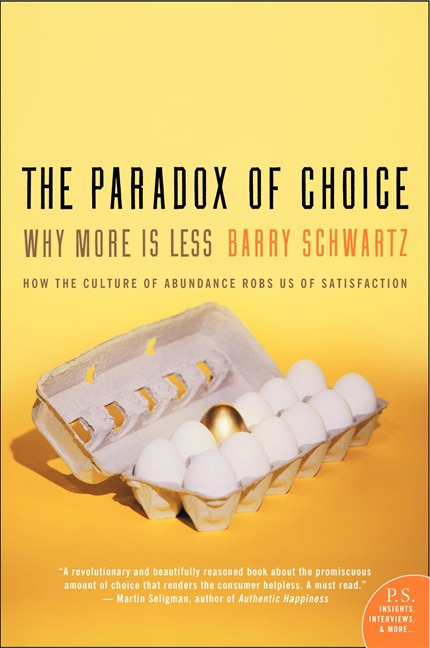The Paradox of Choice Summary
6 min read ⌚

Why More Is Less & How the Culture of Abundance Robs Us of Satisfaction
Have you ever gone to a supermarket with the idea of buying a bottle of Coca-Cola and ended up buying… well, exactly that only two hours later?
Don’t worry: we all have. And it’s not your fault: it’s society’s. It’s a problem sociologists call “choice overload.”
OK, that’s not exactly the technical term for it. But, stay with us and let Barry Schwartz tell you the more used one.
In addition to so much more.
Who Should Read “The Paradox of Choice”? And Why?
We live in a world of choice. And we’ve grown accustomed to believing that choice equals freedom. Yet, there’s almost no person on this planet that hasn’t felt, at least for one time during his life, paralyzed by the inability to choose between the proposed options.
“The Paradox of Choice” tries to explain the reasons behind this problem. And to give few practical pieces of advice on how to overcome it. That’s why we’re guessing that it will be appealing to a wide range of people.
Those who’ve enjoyed books such as “Future Shock” by Alvin Toffler will like Schwartz’s similar book even more.
About Barry Schwartz
 Barry Schwartz is an American psychologist. He received his BA from New York University in 1968 and obtained a Ph. D. degree from the University of Pennsylvania three years later.
Barry Schwartz is an American psychologist. He received his BA from New York University in 1968 and obtained a Ph. D. degree from the University of Pennsylvania three years later.
Currently a Professor of Social Theory and Social Action at Swarthmore College, he is a frequent collaborator of “The New York Times’ where he psychologically analyzes current events.
He is the author of eight books, the last one being “Why We Work.” A revered speaker, Schwartz has shared his findings of “The Paradox of Choice” during a beloved TED Talk, viewed by more than 10 million people.
“The Paradox of Choice Summary”
Imagine how you’d react if someone told you that, starting from tomorrow, you’ll be able to stream only half of the films you can today.
Time for a worldwide #QuitNetflix Twitter campaign, right?
Now, what if we told you that it’s for your own good?
In fact, that’s the starting point of “The Paradox of Choice.”
In it, Barry Schwartz suggests that we are wrong to equate choice with freedom. Because the equation works only to some point. In other words, more choice does mean more freedom, until it evolves into a state of overchoice, when it leads to confusion, anxiety, and stress.
Or, even a state of analysis paralysis.
True, it rhymes and it does have some melody to it, but, let’s face it – no phrase which includes the word “paralysis” in it is a positive one.
Analysis paralysis means that by facing an abundance of choices, you’re locked in a state of overthinking, which might lead to a situation where you can’t make your choice at all.
In short: many options, much thinking, no action.
And that, my friend, is why you bought your Coca-Cola two hours after going inside the supermarket! Even though it was the only thing you wanted in the first place.
And it only gets worse from there!
Because the problem is not only finally making the choice. It’s also whether you’ve made the right one. And, moreover, the fear of making the wrong.
“The Paradox of Choice” goes even a step further. It warns that, nowadays, even making the right choice may lead to no satisfaction at all.
Why?
First of all, let’s get one thing straight: no matter where you stand on the subject, you’re either a maximizer or a satisficer.
If you’re satisficer, you’ve learned that there will always be something better. And you’ve chosen not to worry about that. In a way, you’ve made a conscious decision that the fact you’re offered so many options, doesn’t mean that you have to try them all.
In other words, you’ve constrained your freedom in order to get some satisfaction out of your choices.
Interestingly enough, this is, by far, the better option.
The alternative?
Well, if you’re a maximizer, you want each and every one of your choices to be the right one. And how can you know if you’ve made the right choice until you analyze the possible effects of each one? An overwhelming task!
The catch?
It’s psychologically exhausting as well. So, ultimately, even making the right choice yields no satisfaction at all. But, making the wrong choice is, obviously, much worse.
So, you’re bound to be unhappy.
Let us summarize this in laymen’s terms.
This night, you’re either watching one of the first few films that pops out, or no film at all! Because, the alternative is scrolling for two hours and watching hundreds of trailers, before making an informed decision and start watching a film with too many expectations involved.
And you know where that ultimately leads you to?
You won’t feel satisfied – even if the film is great!
Key Lessons from “The Paradox of Choice”
1. Choice Doesn’t Lead to Freedom, Which Doesn’t Lead to Welfare
2. Choosing Makes You Suffer
3. Practical Advice: What Can You Do?
Choice Doesn’t Lead to Freedom, Which Doesn’t Lead to Welfare
OK, this is as counterintuitive as it gets! How is it possible that more choice doesn’t mean more freedom, and, especially, more welfare? After all, this was what the Cold War was all about!
Well, guess again: more choice works only to a certain extent, after which it is detrimental to your health and happiness! Especially if you’re a perfectionist, in which case even buying a bag of potato chips is a task as daunting as automatizing census data in the 19th century!
Choosing Makes You Suffer
In, oh, so painful way!
Barry Schwartz claims that the abundance of choice we face daily often leads to feelings of depression and loneliness. Why?
Because when you have the option to choose from everything, and you’re still not happy, it must be your fault. And if it’s your fault, then you have to learn to choose better. But, that only leads to over-thinking your next choice and not acting, which makes you even more unhappy.
Practical Advice: What Can You Do?
There’s a way out of this vicious circle.
The last chapter of Barry Schwartz’s book is a list of 11 practical bits of advice which may help you overcome the paradox of choice. We feel that some of them are repetitive, so we’ll summarize the too.
Firstly, you need to make a decision when to choose and be a chooser, instead of a picker. There are some choices which are important, and others which don’t deserve your time and energy.
Next, stop being a satisficer instead of a maximizer and make your choices irreversible. Learn to leave with more mistakes and fewer regrets.
You’ll manage this if you control and adjust your expectations, by not comparing your choices to other people’s. We are different. Why should our choices be similar?
Finally, learn to love constraints. As any creative person will tell you – they’re good. After all, why do poets so often choose to write rhyming couplets, instead of using free verse at all times?
Like this summary? We’d Like to invite you to download our free 12 min app, for more amazing summaries and audiobooks.
“The Paradox of Choice” Quotes
We can imagine a point at which the options would be so copious that even the world’s most ardent supporters of freedom of choice would begin to say, ‘enough already.’ Share on X Perhaps confidence in the market is justified. But even if it is, it shifts the burden of making decisions from the government to the individual. Share on X The downside of counterfactual thinking is that it fuels regret, both postdecision regret and anticipated regret. Share on X When you have only a few options, you do the best you can, but the world may simply not allow you to do as well as you would like. Share on X What happens when you have too many options is that you are responsible for what happens to you. Share on XOur Critical Review
“The Paradox of Choice” is a book primarily concerned with Western affluent societies. Schwartz’s idea is that just as much as third-world countries would profit from having more choice, European and North American countries would benefit from having less. Because their people are growing more and more unhappy.
And he harnesses the power of sociological and economic research to convincingly support his quite compelling argument, to begin with. So, even if you don’t agree with Schwartz, read what he has to say on the subject first. Or, at least watch his TED talk. It’s worth it.
Emir is the Head of Marketing at 12min. In his spare time, he loves to meditate and play soccer.







